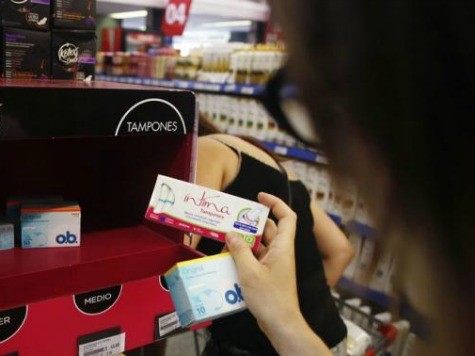The government of Argentina is facing heavy criticism for its heavy-handed control of the economy in light of a recent tampon shortage.
The shortage lasted 20 days, as wholesalers and store owners could not find legal means to stock their shelves.
The Argentine government announced last week that it had finally defeated the tampon shortage. Johnson & Johnson reported to the government via email that they had “regularized” the importing of tampons after a 20-day drought that generated heavy criticism, particularly given an increased demand for the product due to the summer’s high temperatures.
The government responded to the shortage, in large part, by blaming the media. As Bloomberg reports, Commerce Secretary Augusto Costa stated in a radio interview that the shortage was “induced by media operations,” claiming that demand had increased because outlets were reporting that there was a shortage in the product, rather than journalists reacting to the shortage and simply reporting what they saw.
Other government officials retorted that such a claim was nonsense; chair of the Argentine Chamber of Importers, Miguel Ponce, noted that “the central bank owes importers about $5.5 billion for authorized purchases,” which is what causes shortages in products, not a media frenzy.
Economic analysts and reporters appear to agree. In a column for Infobae last week, Adrián Ravier distills the problem:
The tampon shortage has only one cause: the economic model. In Argentina, the model is principally characterized by thinking that a group of people centralized in a Commerce Ministry can respond to the demands of consumers with greater efficiency than the market, where decisions are made in a decentralized fashion and with the knowledge of problems and necessities based on time and place.
That thinking, Ravier concludes, will lead to future shortages of imported products because all such items must be approved by the government, and it is difficult to predict which shortage will hit next.
A week following the tampon crisis, the debate over Argentina’s closed market is reaching a fever pitch. As Reuters reports this week, Ponce has taken once again to highlighting the extreme level of inefficiency at the top of the Ministry of Commerce. “The government has no long-term strategy for imports. … It just deals with each issue as and when it arises,” he explains to the new outlet, which results in shortages amassing as the market is stifled from producing according to demand. With inflation close to 40%, consumers are becoming increasingly frustrated by the government of President Cristina Fernández de Kirchner, just as the nation gears up for elections in October.

COMMENTS
Please let us know if you're having issues with commenting.